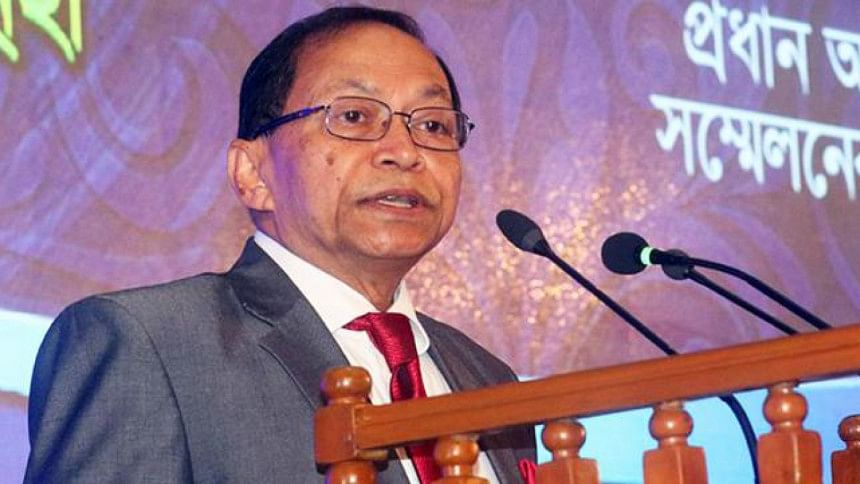News Analysis: Separation that never ends

An unhappy Chief Justice Surendra Kumar Sinha on Tuesday said that the judiciary was being held hostage by the government's non-issuance of a gazette notification regarding disciplines and conducts of lower court judges.
He made the remarks as the government's repeatedly asked for more time to issue the gazette notification.
Making the rules in line with the apex court's directives is one of the required measures for effective separation of the judiciary. Here is the reason for his frustration:
The constitution of 1972 made a provision for separation of the judiciary from the executive. But none of the successive governments did anything on their own to fulfill this constitutional obligation.
Twenty-five years after the enactment of the constitution, the High Court in May 1997 in a landmark verdict asked the government to separate the judiciary in line with the constitutional provision.
The HC delivered the judgement in response to a writ petition filed by 441 judicial officers who were judges in different civil courts.
They had challenged the legality of the creation of BCS (Judicial) Cadre along with other BCS executive and administrative cadres by Bangladesh Civil Service (Reorganisation) Order 1980.
The then AL-government challenged the judgement. It filed an appeal with the Appellate Division of the Supreme Court.
Upholding the HC verdict, the Appellate Division in its milestone ruling in December 1999 issued 12-point directives to the government to separate the judiciary.
The directives included formation of a separate judicial service commission to take care of the appointment, promotion and transfer of members of the judiciary in consultation with the SC and a separate judicial service pay commission, amendment of the criminal procedure and new rules for the selection and discipline of members of the judiciary.
Being defeated, the government opted for buying time to take necessary measures like formulation of rules and regulations to implement the judgement until the tenure of the AL-led government ended in October 2001.
After the changeover in power, the BNP-led government in its five-year tenure did the same.
Both AL and BNP-led governments from 1999 to 2006 took more than two dozen time extensions to complete the necessary work.
This expediency of seeking time extension by the previous governments shows their unwillingness to implement the apex court verdict to separate the judiciary.
Finally, it was the caretaker government of 2007-08 period that took effective steps to separate the judiciary.
In November 2007, it officially separated the judiciary from the executive based on the constitutional directive principles and the SC judgment in the Masder Hossain case. Some rules were also made.
The separation, however, irked the admin officials who lost their judicial clout following the separation. They went on to stage demonstrations against the move in October 2007.
The process was not completed however. Complications prevailed over issuing the gazette notification on the rules determining the discipline and code of conducts for lower court judges.
The government sent the draft rules to the SC for its opinion last year. The court revised the draft by curtailing the law ministry's control over lower judiciary and sent it back to the government for approval.
But the government was in no hurry to do so. It has already taken several time extensions. On Tuesday, it again applied for time extension resulting in an expression of dissatisfaction by the SC at the government's failure to issue the gazette notification within the specified timeframe.
On November 7 last year, the SC expressed disappointment that the government did not finalise the rules outlining the job disciplines for lower court judges.
On Tuesday, the government was again granted two weeks time to do the work.
DREAM FOR AN INDEPENDENT JUDICIARY
Framers of the constitution had envisioned an independent judiciary free from the control of the executive branch of the government.
Considered a result of the Liberation War, the constitution, in article 22, unambiguously says: "The State shall ensure the separation of the judiciary from the executive organs of the State."
Separation of the judiciary is one of the fundamental principles of the state policy and independence of the judiciary is one of the basic tenets of the constitution enacted in 1972.
Independence of the judiciary has been undermined on several occasions since 1975 through constitutional amendments. During the two martial law regimes, independence of the judiciary has been compromised even more.
The SC on several occasions also urged the government to restore the provisions of the original constitution of 1972 for effective separation of the judiciary from the executive. But nothing happened.
ITS IMPORTANCE
"Judicial independence does not exist to serve the judiciary; nor to serve the interests of the other two branches of the government. It exists to serve and protect not the governors but the governed," Sir Gerard Brennan, former chief justice of Australia, said in November 1996 in a judicial conference.
An independent judiciary is regarded as the hallmark of good governance, rule of law and exemplifies the sought-after goal of separation of powers of the state.
"It is the judiciary which is entrusted with the task of keeping every organs of the State within the limits of the law and thereby making the rule of law meaningful and effective," observed the Supreme Court of India in a judgment.
World Justice Project in its report on rule of law index of 2016 said effective rule of law reduces corruption, combats poverty and disease, and protects people from injustices large and small.
"It is the foundation for communities of peace, opportunity, and equity -- underpinning development, accountable government, and respect for fundamental rights," it adds.
In the index Bangladesh ranked 103 out of 113 countries. The poor ranking shows the sorry state of rule of law in Bangladesh and the deficiency in the independence of judiciary.

 For all latest news, follow The Daily Star's Google News channel.
For all latest news, follow The Daily Star's Google News channel. 



Comments